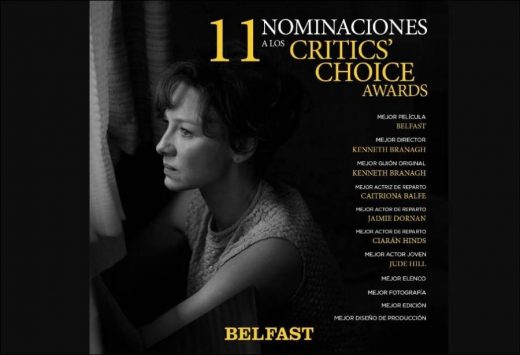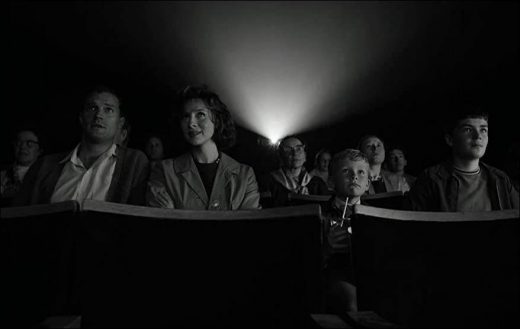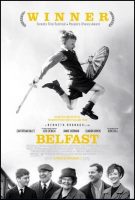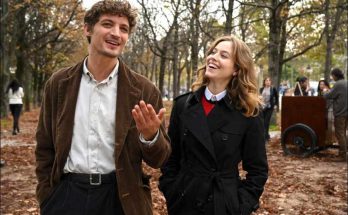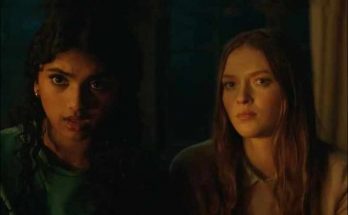Starting with the Russian occupation of Ukraine on February 24, 2022, with live broadcasts and comments from Ukraine on newspapers, television programs, social media every day, civilians, soldiers, bombed cities, towns, refugees, shelters Belfast (2021), written and directed by Kenneth Branagh, based on the long-term war in Northern Ireland, was released in the cinemas and best film, best director, best supporting actress (Judi Dench) was nominated for seven Oscars, including best editing and sound.
Actor and director Kenneth Branagh portrays the conflict in Northern Ireland in the late 1960s through his own childhood memories. In the semi-autobiographical film, through the eyes of Buddy (Jude Hill), the relatively quiet lives of Catholic and Protestant neighbors living in the same neighborhood in Northern Ireland, igniting the process that will lead to civil war with the support of the government and churches, and the beginning of fearful waiting, looting and violence.
Branagh was only 8 years old when he experienced the first attack that started in his neighborhood in the movie, and 10 when he left Belfast with his family and immigrated to England. The director stated that both leaving his hometown and the process of adaptation in the place he immigrated created important breaking points in his life. says. Then, he states that he went into a serious adaptation process by withdrawing into himself in those times when the Irish were seen as second-class in England, and today he never feels like a stranger in England (interview Frank Arnold, February 25, 2022, epd film).
In the movie, 9-year-old Buddy’s father Pa (Jamie Dornan) works in London and comes to visit his family on the weekends. With the conflicts that started in Belfast, his father decides to leave the city where they live for the future of his children, but his wife (Caitriona Balfe) does not want to leave this city, the neighborhood where she was born and grew up.
Like her mother, Buddy doesn’t want to be separated from the street where she grew up, her first love Catherine (Olive Tennant), her school project, and her retired mining worker grandfather Pop (Ciarán Hinds) and grandmother Granny (Judy Dench). Buddy is an inquisitive child who tries to understand the world with the fascinating effect of the western movies he watches in the cinema with his family and on TV with his older brother, and seeks answers to the questions that arise in his mind between the world of imagination and the life he is experiencing.
One day, while playing with his friends on the street, he suddenly finds himself in a traumatic atmosphere of noise and violence, like in a war movie. Buddy experiences this raid on their neighborhood with all the innocence of childhood. While he tries to make sense of what the priest, who goes to the Protestant church with his older brother Will (Lewis McAskie) every Sunday, speaks with angry enthusiasm, is already beginning to worry him that the girl he loves is Catholic.
His emotional tides and his biggest refuge in this complex process are his conversations with his grandfather and movies. Especially in the world of adults, the children of the neighborhood form their own understanding of the world in fear and anxiety, with new experiences, learnings, events they observe, and half-hearted information they hear from the conversations of adults.
The Belfast movie begins with a period of a long-lasting struggle dating back to the 1600s, which the Catholic Irish started against the English and Scots who came to their island, which flared up again at the end of the 1960s. In fact, the ongoing armed struggle with the IRA (Irish Republican Army) established in Dublin in 1916, the independent Irish Republic established in the south and the connection of the north of the island to British rule, the Catholic and Protestant conflict that broke out again in the North in the 1960s, This process, which lasted until the agreement reached, is the story of a war that could be resolved with the IRA laying down its arms and giving Northern Ireland the possibility of on-site administration. During this period, hundreds of people were displaced, crippled, lost their lives, and had to experience all the hardships of the traumatic civil war in prisons and exiles for generations.
Director Branagh describes a period in which fear and unrest prevailed with the rapid spread of internal conflicts, which started with the attack on the neighborhood where Catholics and Protestants lived ‘relatively’ together and peacefully in Belfast in the late 1960s. It also reflects a nostalgia for the past. He manages to present a long-lasting civil war in the pure and innocent naturalness of his childhood, without ignoring the elements of comedy such as fear and anxiety in the flow of daily life.
In short, Kenneth Branagh combines the war period of the past, in the shadow of the bombs, looting, those who were displaced from their homes and homes, but also the dreamy world of childhood, family relationships, the neighborhood culture, where children grew up safely, the neighborhood relations, with the magic of cinema and the magic of cinema. succeeds in bringing together the beautiful memories, the longing and respect he feels for his hometown, through the eyes of Buddy, who grew up in a typical working-class family.
Finally, in the movie Belfast, Buddy reflects on the fork in the church that the pastor talked about in his sermon. Buddy tries to understand the difference between Catholics and Protestants. In 1969, this fork in the road led to the beginning of an uprising in Belfast, the capital of Northern Ireland, in which Catholics and Protestants came face-to-face, and then into the whirlpool of a civil war in which Molotov cocktails, cobblestones turned into bullets, gangs were organized, shops were looted, but at the same time resistance was organized.
The point reached in Russia and Ukraine today has entered a crossroad where thousands of people will lose their lives, become homeless, unemployment and poverty will prevail, and will affect the world with the economic, psychological and ecological consequences of years of war trauma. In these circumstances, I end my article with a quote from Wolfgang Borchert’s “Say No!”1 poetic manifesto against fascism and war:
With the voice and words of mothers; “If all the mothers of the world order you tomorrow to give birth to children who will nurse in military hospitals and fight in new wars, there is only one thing you can do: say no! Mothers, Say No”
“The last animal cry of the last animal-human will drown in pools of blood, unheard, unanswered… All of this will happen, tomorrow maybe tonight, if… if… if…
Related page: All about Belfast movie.
Belfast (2021)
Directed by: Kenneth Branagh
Starring: Judi Dench, Caitriona Balfe, Jamie Dornan, Ciarán Hinds, Jude Hill, Lara McDonnell, Olive Tennant, Zak Holland, Barnaby Chambers, Claire Ashton, Lewis McAskie
Screenplay by: Kenneth Branagh
Production Design by: Jim Clay
Cinematography by: Haris Zambarloukos
Film Editing by: Úna Ní Dhonghaíle
Costume Design by: Charlotte Walter
Set Decoration by: Claire Nia Richards
Art Direction by: Dominic Masters, Stephen Swain
MPAA Rating: PG-13 for some violence and strong language.
Distributed by: Focus Features
Release Date: September 2021 (TIFF), November 12, 2021
Views: 435
